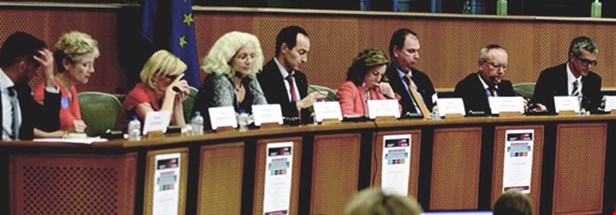Patients’ Opinion: a Prerequisite to any Debate on Access
 ©PACT
©PACT
EPF was recently invited to provide its position on access to healthcare in three important meetings in Brussels. Highlighting the patients’ perspective, EPF positions itself as a pivotal player in this crucial debate at the EU level.
If the importance of a topic is decided by the number of events devoted to it, then no one can deny access to healthcare is becoming central to the health-related European scene. With important stakeholders (including EPF) clear in their positions, with press articles and opinions mushrooming on various platforms, it is obvious the topic is gathering pace.
In just over two weeks, EPF was invited to give its opinion in three important public meetings.
On the 29th of June, EPF Secretary General Nicola Bedlington co-chaired the second session of the European Parliament Interest Group on Access to Healthcare, together with Stanimir Hasurdjiev, EPF Board member and Patient Access Partnership (PACT) Secretary General. The meeting gathered supporting MEPs Karin Kadenbach (S&D, Austria), Andrey Kovatchev (EPP, Bulgaria) and Katerina Konecna (GUE/NGL, Czech Republic) and representatives of the European Commission and the Dutch Ministry of Health.
In front of a large audience, the highlight of the meeting was the intervention of MEP Soledad Cabezón Ruiz (S&D, Spain) rapporteur of the European Parliament own initiative (INI) report on Access to Medicines. Mrs Cabezón Ruiz took this opportunity to present the blueprints of her report, underlining the need for a system change, from a fragmented IP rights-based market to a more transparent and participative one. MEP Cabezón Ruiz also indicated that her report will be debated within ENVI after the summer break, with the aim to discuss it in a plenary session early 2017.
Recalling the activities launched by the Dutch EU Presidency on Access to Medicines, Dr Marcel Van Raaij from the Dutch Ministry of Health, referred to the leitmotiv that guided the Presidency: ‘Timely access to innovative products but with affordable prices’. Dr Van Raaij used this opportunity to remind the audience of the Council Conclusions of June. These set out a list of challenges and priorities Members States and the Commission are requested to take into account. Not the least is the feasibility of voluntary cooperation between Member States on pricing and reimbursement (information sharing, negotiations with selected countries and cooperation on HTA).
This particular point mirrors the initiative of the BeNeLux countries and Austria, as well as the one recently taken by some Central and Eastern Europe (CEE) Member States. On this, Stanimir Hasurdjiev comments: ‘smaller and poorer countries have to get together, to combine their forces, as they are facing the same challenges: their healthcare expenditure is growing faster than their GDP. This is not tenable’. Following a first meeting in June in Sofia, the same countries have met once more in Romania in July, reflecting on the recent developments and discussing the possibility of a further cooperation.
Nicola contributed to the discussion by referring to our recent statement on the Value and Pricing of Innovative Medicines, very much in line with the recent claims for dramatic change of the EU pharma model. She called for shared responsibility and strong leadership to move towards a commitment to ethical conduct and solidarity from all stakeholders including industry. Following the publication of our major political statement, EPF intends to be involved in the current and future discussions, building on the principles and actions related to universal access.
On the 11th of July, Nicola took part in the European Policy Centre (EPC) event on ‘Achieving the Health Sustainable Development Goals’, organised by the EPC’s programme Coalition for Health, Ethics and Society (CHES). Invited as a CHES Steering Committee member, Nicola outlined EPF’s position on access to healthcare and underlined EPF’s intention to infuse a strong patients’ perspective in the future discussions on the Sustainable Development Goals (SDGs). Nicola also highlighted the alignment of EPF’s work on access with the health-related SDG of universal access by 2030, seizing the opportunity of this call to collect more political support from the various stakeholders.
Finally, on the 14th of July, our Director of Policy Kaisa Immonen was invited to speak at the European Parliament ENVI workshop on ‘EU options to improve access to medicines’. Chaired by MEP Soledad Cabezón Ruiz, the meeting brought together diverse stakeholders and officials from the EU institutions. Speaking in the opening session, Kaisa introduced EPF’s statement on the value and pricing of innovative medicines, highlighting that ‘treatments should be based on needs, not on means’. In a full room, Kaisa’s demonstration of our perspective on access was well received and strengthened our position as the central platform representing patient’s opinions on this crucial debate.
Contact person:
Nicola Bedlington, Secretary General.
